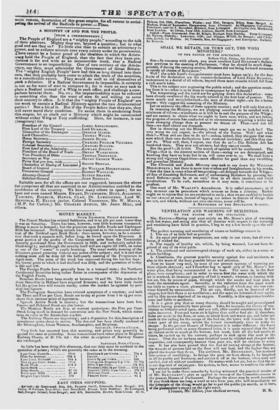VENTILATION AND WARMING OF BUILDINGS. TO THE EDITOR OF THE
SPECTATOR.
MR. EDITOR—Having read your article on Mr. H000's plan of warming with hot water, and seeing also that all theories with respect to the warming and ventilating have failed in practice, I beg to say a few words open the sub- ject.
The perfect warming and ventilating of rooms or buildings consist iu I. The use of as little fuel as possible. 2. An equal and pleasant temperature, not only in one room, but all over a house, if wished for. 3. The supply of healthy air, which, by being warmed, lias not been de- prived of any of its vital parts. 4. The continual and uninterrupted change of such air, either in a room or whole building. 5. Cleanliness, the greatest possible security against fire and accidents, IS also in the want of the least possible labour and attention.
Now we know very well, by none of our present systems of warming are these objects obtained ; and I therefore beg to speak only of Mr. Iloon's but water plan, that being recommended as the best. The same is, in the first place, very complicate; and in order to warm first the water with which the air is warmed, an immense quantity of fuel is wasted ; whereas, in heating with hot air, fire, by means of pipes, through which the smoke and heat pass, is made the immediate agent. Secondly, is the radiation from the pipes much too little to warm a room pleasantly and equally ; of which any one can con. vince himself by examination. The air can, thirdly, not be deprived of its oxygen; but then there is no ventilation ; and the same air is breathed over again, and by this means deprived of its oxygen. Fourthly, is this apparatus trouble- some and liable to accidents. It is sgreat pity that so many theories should be taught and promulgated without having practically been proved. Take, for instance, the theory of ven- tilation as hitherto acted upon, and you will, after careful consideration, find it quite incorrect. Pure and warm air is lighter than cold or foul air if, therefore, holes are made in the floor, or hear, to admit fresh and warm air, and holes are made in the ceiling for the escape IA the foul air, the latter will remain in the lower part of the room, whilst the former immediately, risis to make its escape. lu the proent Houses of Parliament it is rather diTerent : the Boors being perforated with so many thousand holes, it is quite natural that the foul air cannot settle so much at the bottom, but must, with all the bad smells at times, be =tried up by the current, perhaps to sink again like mud in the water. That the air we have once breathed must be vitiated and charged with impurities, and consequently heavier than pure air, will be obvious to every one. It has also been proved that the foul air resting always at the bottom, the wounds of persons laid on the floor will not heal, and the higher they ant placed the sooner they do so. The architect, Mr. BERNHARDT, has reversed this system of ventilating : he brings the pure air from above, to be breathed in all its purity and freshness, and carries it off at the buttotn, when used and spoiled, and all without machinery. Ile warms with hut air, but 140 that the air is not deprived of its:oxygen his system, in fact, seems to combine the advan- tages already enumerated. I am led to make these remarks by having witnessed the practical results of of Mr. IllIti:HARDT'S plan as applied to several of the Committee-rooms in the present Bowies of Parliament. Perhaps the above may be worth insertion. If you think them too bag, a word or two front you, who will immediately see the riaci,1e of the thing, would go far to put the public (in search, as it were,
of tlas p Oar's atone) on the right scent. I remain, Mr. Editor, your obedient servant, IL K.


























 Previous page
Previous page